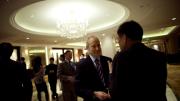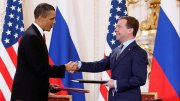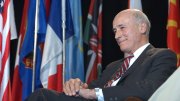In introducing the luncheon speaker, William Kirby joked that when Chinese premier Wen Jiabao came to Harvard, Sanders Theatre was booked for Michael Sandel’s “Justice” course, and so was unavailable as a lecture venue. Would the premier like to address the class? he was asked. Instead, Kirby said, he declined and chose to visit Harvard Business School.
Whatever their differences in history and culture, said Sandel, Bass professor of government, both the United States and the People’s Republic face the predicaments arising during the past few decades as market thinking, institutions, and values have reached into spheres of life traditionally governed by nonmarket norms. Neither this expansion of markets nor their limitations has been thought through seriously, he said: “[M]arkets are not mere mechanisms,” and can taint the goods and social practices they come to govern. He cited for-profit schools, hospitals, and prisons; the outsourcing of military functions to contractors; the sale of organs and access to transplants; childbearing for pay—for example, to India, which has legalized commercial surrogacy, an appealing alternative on efficiency grounds compared to the higher costs for such services in England and the United States; and, in China’s hospitals, the sale of appointments to be seen by a medical professional. He cited a discussion in the economic literature of selling access for immigration, and even for citizenship—in effect, turning refugees into revenue sources, not people in need of help.
“Markets leave their mark,” Sandel asserted: once a good or service is for sale, it is valued as a commodity, abstracted from moral or political considerations. An incentive—payment for learning to read, for instance—becomes the end itself, not the means, displacing the behavior it was meant to encourage. During an era of “market triumphalism,” he said, people had drifted from “having a market economy to being a market society”—a transition that many have accepted without reflection, given markets’ power to organize valuable productive activity. Evaluating options and behaviors solely in terms of efficiency or consent causes people to neglect moral and political questions; the hard work of teasing out the moral meanings of goods or behaviors, and determining their value by the proper standards, is overlooked. Use markets properly, he urged, but be careful to protect the moral and civic goods that “markets do not honor and money cannot buy.”
It was a challenging message in the environs of a society that imposes tight controls on political activity and speech, but has encouraged unfettered markets to propel economic growth during the past three decades.









